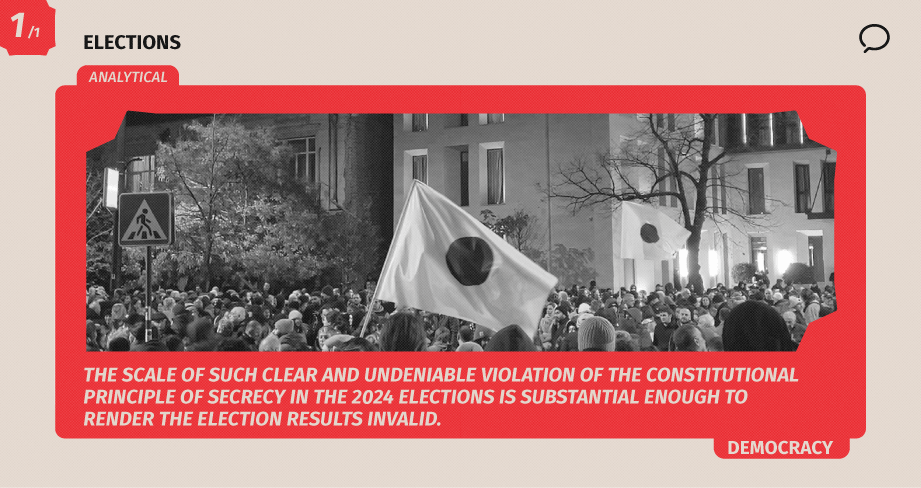In a bipartite political landscape, emotional polarization stands out as the most effective mechanism of voter mobilization. In such an environment, political parties often tend to forego the development of comprehensive strategies to address societal issues. Instead, politics becomes overshadowed by propaganda, as parties seek support through meaningless attacks on their opponents.
Our comment
In February, the government initiated legislative proposals concerning foreign influence in the parliament. These proposed bills mandated the registration of non-entrepreneurial (non-commercial) legal entities as “agents of foreign influence/power” in a specialized registry. The ruling party's decision to initiate discussions on these bills in the legislative body served multiple objectives, one of which was to exacerbate existing polarization. Following the widespread public protest, the ruling party officially retracted its initiative, refraining from enacting it into law. Nonetheless, it persists in targeting individuals and groups not aligned with the Georgian Dream, employing the aforementioned term as a demeaning insult.
Why are we discussing this topic?
This marks the second occasion on which we have addressed the issue of polarization on our platform due to the significant damage it inflicts upon our country:
Primarily, it is crucial to acknowledge that the polarization deepened by the Georgian Dream is fueled by government propaganda. It serves their objectives and has the sole aim of instigating discord within our society.
Secondly, polarization impedes our European integration. The European Commission has stated that the Georgian government needs to address polarization as a key requirement to become a candidate for EU membership.
How is polarization fueling the aspirations of the Georgian dream?
The political landscape in Georgia is marked by a significant degree of polarization. Two key aspects should be highlighted in this context. Firstly, it's important to note that this controversy does not stem from disparities related to content, ideological vision, or conceptual foundations. It is primarily driven by personal animosity and emotions, a phenomenon commonly referred to as affective polarization. Another essential feature of this discord is that it is predominantly elitist, confined exclusively to political parties and leaders, with limited incidence observed among social groups. In other words, what is commonly referred to as mass polarization does not naturally occur in Georgia. However, it appears that the government decided to artificially stimulate this polarization. Presumably, they deemed that solely elite polarization was insufficient to attain electoral objectives and mobilize an adequate number of voters.
Initially, it is important to delineate how polarization benefits political parties. Opposing parties label each other as “enemies”, while portraying their supporters as a“'acceptable” individuals. They perpetuate the perception of these “enemies” as an ongoing threat to society, framing each subsequent election as the choice between the “presence” of their party and the 'absence' of what they deem detrimental to society. This provides them with ample room for propaganda to influence public opinion and garner electoral support. The presence of thematic reasoning in such discussions is practically impossible.
This strategy exhibits a distinct characteristic: polarization demands constant fuel, continuously pulling parties into deeper division; without this, expanding the electorate is unattainable. Political parties require to capture the attention of new groups of supporters. It appears the ruling party encountered this challenge too and contemplated deepening of polarization as a solution. Prior to the 2024 parliamentary elections, it became necessary to identify a new “enemy” perceived to threaten the nation's very existence.
What could be deemed a more significant peril than a “fifth column” capable of “undermining the fortress from within”? This is a concern posed by the Georgian Dream, suggesting the presence of a large group funded by foreign countries and carrying out their interests, operating not in the service of its citizens, but rather executing agendas imposed by external forces. The government chose to categorize all civic groups as “agents of a foreign country”, enshrining this assertion in legislation. They attempted to officially name specific individuals as targets as a basis for their negative campaign.
Fortunately, the discerning public prevented the ruling team from enacting the proposed law. However, this outcome does not preclude the government from seeking to attain its objectives through alternative means. The withdrawal of the bills was not an admission of defeat but rather a strategic retreat. The Dream acknowledged the resistance they encountered and opted not to escalate the situation. Moreover, in addition to legislative measures, the government possesses numerous other tools at its disposal. Despite the rejection of the draft laws, government officials persist in labeling critics as “agents”, evident in posters appearing on streets identifying specific individuals targeted by this label. A propaganda machine continues to operate. While the bills may have been withdrawn, the associated label endures.
The government's current strategy entails designating a particular group as an adversary and convincing the populace that their well-being is impeded by the mere presence of this group. And subsequently, position itself as the sole entity capable of addressing this issue and thereby attract voter support. However, this tactic represents only one aspect of such propaganda. The other dimension involves deliberately sowing seeds of distrust and provoking conflicts among different segments of society. As polarization deepens, the risk of civil conflict escalates, and our government appears to be gambling with this peril.
The material was prepared within the framework of the project “Supporting an inclusive and consensus-based political environment in Georgia" financed by the Heinrich Boell Foundation Tbilisi Office - South Caucasus Region. The opinions expressed in the material belong to Komentari and may not reflect the views of the Foundation.











